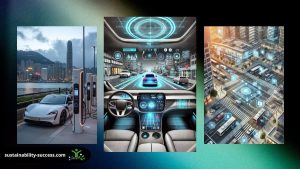Urban transportation is going through a huge change. Electric vehicles (EVs) and smart city technologies are leading the way. But what does the future really hold for our daily commutes?
One thing’s for sure: the gas-powered car isn’t the only option anymore. While there’s a lot of buzz about autonomous driving and EV batteries, we shouldn’t overlook innovations like pantograph charging.
Electrifying Our Roads: The Surge of EVs

Electric vehicles are becoming more common. Car companies unveil new models almost every month. EVs are going farther on a single charge, and they’re getting cheaper. Governments worldwide are pushing for cleaner air, which is also driving this shift.
The Benefits of Electric Cars
EVs bring a lot of advantages. They produce zero exhaust emissions, helping to reduce urban pollution. They’re also quieter than traditional cars, making cities more peaceful.
Plus, electricity is cheaper than gas, and EVs are cheaper to maintain since they have fewer moving parts.
Charging Infrastructure: A Growing Network
Charging concerns remain, but the situation is improving fast. Charging stations are appearing everywhere, from gas stations to shopping malls
Fast-charging tech, like pantograph systems, is making it easier to get a quick charge. Imagine pulling up to a station and getting nearly a full charge in the time it takes to grab a coffee. That’s already a reality in some places.
Battery technology is also getting better, allowing for faster recharges and longer ranges. So, the dreaded “range anxiety” might soon be a thing of the past.
Smart Cities: High-Tech Urban Living

Smart cities use technology to make urban life better. And it’s not just about free Wi-Fi or fancy streetlights. Smart cities cover everything from managing traffic to waste collection.
Traffic Management: Cutting Down Congestion
Traffic is a huge issue in any city. Overcrowded roads waste time and increase pollution. Smart traffic systems use sensors and cameras to monitor traffic flow and adjust lights in real time.
Some systems even talk directly to cars, advising on the quickest routes or suggesting detours when traffic is heavy. This means fewer traffic jams and quicker commutes.
Public Transport: Tech-Driven Efficiency
Public transportation is another area where smart tech can make a big impact. Imagine buses with pantograph charging systems that charge while picking up passengers, no downtime needed.
Commuters could use apps to see exactly when their bus or train will arrive, thanks to real-time data. This is already happening in some advanced cities around the world.
Autonomous Vehicles: The Next Frontier

Fully self-driving cars aren’t common yet, but features like lane-keeping assist and adaptive cruise control are standard in many new vehicles.
Safety and Efficiency
Autonomous cars could significantly improve safety. Most traffic accidents are due to human error drowsy driving, distractions, or poor judgment. Self-driving cars could cut down these accidents by following optimal paths, regulating speeds, and talking to one another to avoid collisions.
Transforming Urban Landscapes
The rise of autonomous vehicles could change our cities. Imagine streets with fewer parked cars as shared self-driving fleets move people efficiently. Spaces that are now parking lots could become parks, playgrounds, or homes.
Challenges Ahead: Not All Smooth Sailing
While these innovations sound fantastic, they come with challenges.
- Grid Concerns: The electrical grid needs updates to handle the growing number of EVs. It’s not just about generating more electricity; we also need better distribution networks to ensure efficiency and reliability.
- Privacy Concerns: Smart cities collect a lot of data through cameras, sensors, and other tracking methods. Protecting this data and using it ethically is crucial to gain public trust.
Final Takeaway: Envisioning a Connected Future
The future of urban transportation is both exciting and challenging. Electric vehicles promise cleaner air and quieter streets, while smart cities offer efficient traffic management and improved public services.
Autonomous vehicles could change how we commute. However, navigating these changes requires a collective effort from governments, businesses, and everyone living in these cities.
In short, our cities could become cleaner, smarter, and more efficient, but only if we handle these changes wisely.

